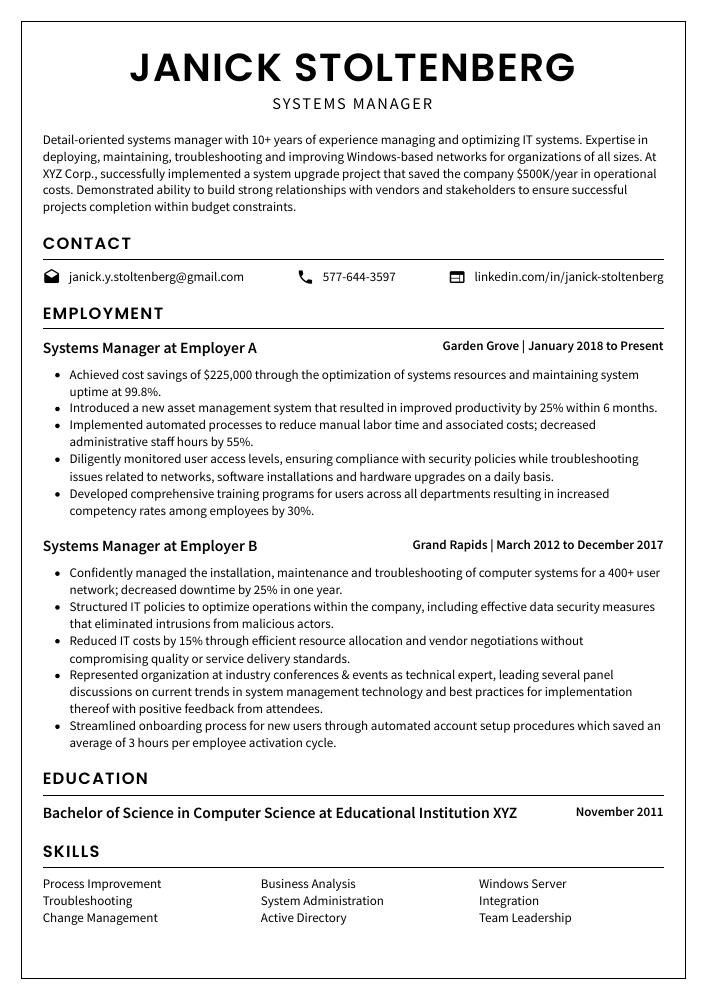Systems Manager Resume Guide
Systems Managers are responsible for designing, developing, and maintaining computer systems to ensure they run smoothly. They work with a variety of software applications and hardware components to configure networks, troubleshoot issues, install security measures such as firewalls, monitor system performance and provide technical support when needed.
You have the skills needed to manage any system, but employers won’t know that until you tell them. To make them aware of your qualifications and experience, you must create a resume that stands out from the competition.
This guide will walk you through the entire process of creating a top-notch resume. We first show you a complete example and then break down what each resume section should look like.
Table of Contents
The guide is divided into sections for your convenience. You can read it from beginning to end or use the table of contents below to jump to a specific part.
Systems Manager Resume Sample
Janick Stoltenberg
Systems Manager
[email protected]
577-644-3597
linkedin.com/in/janick-stoltenberg
Summary
Detail-oriented systems manager with 10+ years of experience managing and optimizing IT systems. Expertise in deploying, maintaining, troubleshooting and improving Windows-based networks for organizations of all sizes. At XYZ Corp., successfully implemented a system upgrade project that saved the company $500K/year in operational costs. Demonstrated ability to build strong relationships with vendors and stakeholders to ensure successful projects completion within budget constraints.
Experience
Systems Manager, Employer A
Garden Grove, Jan 2018 – Present
- Achieved cost savings of $225,000 through the optimization of systems resources and maintaining system uptime at 99.8%.
- Introduced a new asset management system that resulted in improved productivity by 25% within 6 months.
- Implemented automated processes to reduce manual labor time and associated costs; decreased administrative staff hours by 55%.
- Diligently monitored user access levels, ensuring compliance with security policies while troubleshooting issues related to networks, software installations and hardware upgrades on a daily basis.
- Developed comprehensive training programs for users across all departments resulting in increased competency rates among employees by 30%.
Systems Manager, Employer B
Grand Rapids, Mar 2012 – Dec 2017
- Confidently managed the installation, maintenance and troubleshooting of computer systems for a 400+ user network; decreased downtime by 25% in one year.
- Structured IT policies to optimize operations within the company, including effective data security measures that eliminated intrusions from malicious actors.
- Reduced IT costs by 15% through efficient resource allocation and vendor negotiations without compromising quality or service delivery standards.
- Represented organization at industry conferences & events as technical expert, leading several panel discussions on current trends in system management technology and best practices for implementation thereof with positive feedback from attendees.
- Streamlined onboarding process for new users through automated account setup procedures which saved an average of 3 hours per employee activation cycle.
Skills
- Process Improvement
- Business Analysis
- Windows Server
- Troubleshooting
- System Administration
- Integration
- Change Management
- Active Directory
- Team Leadership
Education
Bachelor of Science in Computer Science
Educational Institution XYZ
Nov 2011
Certifications
Microsoft Certified Systems Manager
Microsoft
May 2017
1. Summary / Objective
The summary or objective at the top of your systems manager resume should provide a snapshot of who you are and why you’re the best candidate for the job. You can highlight your technical expertise, such as experience with system architecture design, database administration, and cloud computing platforms. You could also mention any certifications or awards that demonstrate your commitment to excellence in this field. Finally, don’t forget to include how many years of experience you have managing complex IT systems.
Below are some resume summary examples:
Seasoned systems manager with 8+ years of experience leading teams to develop and implement systems solutions. Proven record of developing comprehensive technical strategies that improve efficiency, safety, and accuracy. Looking to join ABC Company as a Systems Manager to drive the delivery of innovative IT solutions for their clients worldwide. Achieved 100% system stability in all projects managed thus far by adhering strictly to best practices in project management.
Driven systems manager with 8+ years of experience in IT systems management. Proven track record of successful project delivery and team leadership, as well as a deep understanding of the system development life cycle (SDLC). Managed multiple large-scale projects at ABC Corp that delivered significant cost savings and process efficiency improvements. Experienced in leading cross-functional teams to ensure successful implementation from design through deployment.
Hard-working, detail-oriented IT systems manager with over 10 years of experience in managing and implementing large IT projects. Highly skilled at coordinating teams and resources to design, install, configure, maintain, troubleshoot and upgrade complex hardware/software solutions for medium to large enterprises. Skilled in developing cost effective network plans that meet customer requirements while achieving high system availability standards.
Amicable systems manager with 7+ years of experience managing and maintaining networks, systems, and applications. Proven record of successfully leading teams in the implementation of IT solutions that meet business needs. At XYZ Inc., managed a team responsible for developing an automated system which reduced human error by 43%. Seeking to join ABC Corp as a Systems Manager to leverage my technical knowledge and leadership skills.
Proficient systems manager with 10+ years of experience leading teams in the design, implementation, and maintenance of complex IT infrastructures. Experienced in managing high-performance cloud environments and developing secure solutions that adhere to industry standards. Seeking to join ABC Company as a Systems Manager where I can leverage my expertise to optimize operations while driving innovation throughout the organization.
Passionate systems manager with 8+ years of experience leading teams, developing and implementing IT infrastructures, and managing projects. Proven track record in driving operational efficiency while achieving project completion on time and under budget. Experienced in deploying software solutions to enhance the user experience. Aiming to leverage expertise at ABC Tech as a Systems Manager overseeing all operations.
Skilled systems manager with 8+ years of experience leading IT teams in the design, implementation, and maintenance of complex network infrastructures. Proven track record of success overseeing projects that exceed expectations while optimizing resources to maximize cost savings. Seeking to utilize interpersonal skills and technical expertise at ABC Company as a Senior Systems Manager.
Accomplished systems manager with 8+ years of experience in designing, deploying, and managing large-scale IT systems. Responsible for the successful deployment of over 200 servers at XYZ Corporation and achieved a 99% uptime rate since implementation. Proven track record of developing efficient solutions to complex problems while ensuring compliance with industry best practices.
2. Experience / Employment
For the experience section, you should list your work history in reverse chronological order. This means that the most recent job is listed first.
When writing this section, stick to bullet points primarily; doing so makes it easier for the reader to take in what you have written quickly and easily. You want to provide detail on what you did and any quantifiable results obtained from those tasks.
For example, instead of saying “Managed IT systems,” you could say, “Successfully managed a team of 15+ system administrators responsible for maintaining over 200 servers across multiple locations.”
To write effective bullet points, begin with a strong verb or adverb. Industry specific verbs to use are:
- Managed
- Administered
- Monitored
- Configured
- Optimized
- Automated
- Troubleshot
- Implemented
- Upgraded
- Documented
- Analyzed
- Resolved
- Tested
- Secured
- Trained
Other general verbs you can use are:
- Achieved
- Advised
- Assessed
- Compiled
- Coordinated
- Demonstrated
- Developed
- Expedited
- Facilitated
- Formulated
- Improved
- Introduced
- Mentored
- Participated
- Prepared
- Presented
- Reduced
- Reorganized
- Represented
- Revised
- Spearheaded
- Streamlined
- Structured
- Utilized
Below are some example bullet points:
- Optimized system performance for 15+ enterprise-level applications, resulting in improved operational efficiency and a 12% increase in productivity.
- Assessed IT infrastructure needs of the organization and revised policies to ensure compliance with industry standards; developed new security protocols to safeguard data against cyber threats.
- Troubleshot hardware/software issues across multiple systems; identified root causes of problems quickly and implemented timely solutions that reduced system downtime by 25%.
- Independently designed & administered network configurations using Windows Server 2008 R2 & VMware vSphere 5 technologies, ensuring maximum uptime without any service interruptions or outages over an 18 month period.
- Monitored all user activities on the company’s LAN environment including access control, authentication methods and data encryption strategies; successfully detected potential security breaches before they occurred 3 times during tenure at current position.
- Managed a team of 10 system engineers to design, install and maintain complex network infrastructures; improved system operations by 35% within 6 months.
- Trained new team members on various aspects of systems management including software installation, hardware maintenance & troubleshooting processes; reduced onboarding time for new hires by 50%.
- Upgraded over 140 servers in the past year to ensure that all equipment was compliant with industry standards and maintained optimal performance levels at all times.
- Expedited problem resolution process across multiple networks using automated monitoring tools and manual checks which decreased downtime from 2 days to 1 hour per incident on average.
- Consistently monitored user activity logs for potential security threats such as malware attacks or data breaches while protecting sensitive client information stored in the company’s databases at all times.
- Mentored a team of 10 IT professionals in the use of systems management software, ensuring that all staff members were fully competent and compliant with internal policies.
- Administered system updates, patches and hardware upgrades across 200+ company-owned computer systems; successfully reduced downtime by 45% over a period of 6 months.
- Effectively managed daily operations for multiple server environments including Windows Server 2008/2012/2016 & Linux OS to ensure maximum performance levels at all times.
- Documented changes made to network configurations such as IP addresses, DNS records and firewall settings on an ongoing basis; improved security measures by 30%.
- Improved system monitoring capabilities by implementing automated alerting tools which identified issues before they became major problems; decreased user complaints related to service disruptions by 40%.
- Formulated and implemented systems policies and procedures, leading to a 40% increase in system performance.
- Prepared detailed reports on network utilization and server hardware inventory; identified areas of improvement, resulting in reduced operating expenses by $5K per month.
- Compiled user access logs to ensure data security compliance with industry standards; conducted periodic audits which improved the overall security posture by 30%.
- Configured firewalls, routers, switches and other networking devices for optimal usage within the company’s networks; ensured uninterrupted internet connections for over 200 users daily without any downtime incidents reported during past 6 months period.
- Resourcefully troubleshot complex IT issues involving software applications & hardware components through remote support sessions with end-users, reducing average resolution time from 4 hours to 1 hour or less depending on severity of problem encountered at times.
- Tested and monitored system performance, troubleshooting any issues to ensure 99% uptime; successfully conducted over 200 diagnostic tests in the last year.
- Analyzed company needs and implemented new systems that resulted in a 15% productivity increase for all departments.
- Spearheaded the migration of data from legacy systems to newer versions, allowing employees greater access to information within shorter time frames; reduced employee downtime by 4 hours per week on average.
- Thoroughly evaluated existing databases & software applications while creating comprehensive reports outlining potential areas of improvement or upgrades; identified opportunities resulting in an additional $20K savings annually for IT expenses.
- Automated manual processes across multiple departments through scripting languages such as Python which led to a 25% reduction in labor costs over 12 months period.
- Utilized advanced network security protocols to secure system architectures and prevent malicious activities, reducing data breaches by 40%.
- Secured regular back-ups of databases and servers on a daily basis; ensured that all systems remained fully functional with minimal downtime across the year.
- Meticulously monitored networks for potential threats using proactive tools such as firewalls, anti-virus software & intrusion detection technologies; resolved over 100 incidents in 12 months.
- Presented reports to senior management detailing risks associated with deployed IT solutions and proposed strategies for mitigating them within budget constraints ($400K).
- Coordinated cross-functional teams of up to 10 staff members in the planning, design & implementation of new systems while adhering to service level agreements (SLAs).
- Facilitated installation and maintenance of various computer systems, networks and information security protocols; reduced IT-related downtime by 40% in the past year.
- Reorganized a complex network infrastructure with over 200 nodes across multiple sites, reducing associated costs by $1400 per month.
- Resolved technical issues for end users within an average time frame of 5 minutes; received outstanding customer satisfaction ratings from 95%+ of surveyed clients.
- Demonstrated expertise in troubleshooting software/hardware errors on operating systems like Windows & Linux to ensure maximum system performance at all times.
- Actively monitored server operations and updated databases regularly to prevent data loss incidents; improved overall system efficiency by 25%.
- Participated in the planning and implementation of new systems, ensuring successful integration into existing infrastructure; reduced system downtime by 40% over a two-year period.
- Advised staff on best practices for using various software applications to optimize workflow processes; increased employee productivity by 15%.
- Reliably monitored server performance to detect any potential issues before they arose, allowing efficient resolution with minimal disruption to daily operations.
- Developed training materials and conducted knowledge transfer sessions for users transitioning from legacy systems to newer technologies; drastically improved user adoption rate within first month of launch by 30%.
3. Skills
Skill requirements will differ from employer to employer – this can easily be determined via the job advert. Organization ABC may require the systems manager to be experienced with Microsoft Dynamics and Organization XYZ might prefer someone who is proficient in Oracle.
It is important to tailor your skills section accordingly because of the applicant tracking systems used by many companies. Their role is to analyze resumes for certain characteristics (such as specific keywords), filtering out those they deem not a good fit for that particular job.
In addition, you should also discuss some of your most relevant skills in more detail elsewhere on your resume – such as within the summary or experience sections.
Below is a list of common skills & terms:
- Account Management
- Active Directory
- Analysis
- Business Analysis
- Business Intelligence
- Business Process Improvement
- Change Management
- Data Analysis
- Data Center
- Databases
- Disaster Recovery
- HTML
- IT Management
- IT Service Management
- IT Strategy
- ITIL
- Integration
- Linux
- Microsoft Exchange
- Microsoft SQL Server
- Network Administration
- Networking
- Operations Management
- Process Improvement
- Program Management
- Project Planning
- Requirements Analysis
- SDLC
- SQL
- Security
- Servers
- SharePoint
- Software Development
- Software Documentation
- Software Project Management
- System Administration
- Team Leadership
- Technical Support
- Troubleshooting
- Unix
- VMware
- Vendor Management
- Virtualization
- Visio
- Windows
- Windows 7
- Windows Server
4. Education
Mentioning your education on your resume will depend on how far along you are in your career. If you graduated recently and don’t have much experience, mention it below the objective statement. On the other hand, if you have a lot of work experience to showcase, an education section might not be necessary at all.
If including an education section is relevant for the job application, try to list courses or subjects studied that relate specifically to systems management roles.
Bachelor of Science in Computer Science
Educational Institution XYZ
Nov 2011
5. Certifications
Certifications are a great way to demonstrate your expertise in a certain field. They can also be used to show potential employers that you have taken the time and effort to stay up-to-date with industry trends and developments.
Including certifications on your resume is an excellent way of highlighting any special skills or knowledge that may be relevant for the job you’re applying for, so make sure they are prominently featured if applicable.
Microsoft Certified Systems Manager
Microsoft
May 2017
6. Contact Info
Your name should be the first thing a reader sees when viewing your resume, so ensure its positioning is prominent. Your phone number should be written in the most commonly used format in your country/city/state, and your email address should be professional.
You can also choose to include a link to your LinkedIn profile, personal website, or other online platforms relevant to your industry.
Finally, name your resume file appropriately to help hiring managers; for Janick Stoltenberg, this would be Janick-Stoltenberg-resume.pdf or Janick-Stoltenberg-resume.docx.
7. Cover Letter
Writing a cover letter is an important part of any job application. It is typically made up of 2 to 4 paragraphs, separate from your resume and provides a personal introduction to the hiring manager.
Cover letters should be tailored for each role you apply for as they give you the opportunity to explain why you are the right fit and how your skills match up with what’s being asked for in the job description. Although not required by most employers, it can be beneficial to write one when applying for positions as it gives recruiters more insight into who you are and what makes you suitable for that particular position.
Below is an example cover letter:
Dear Andreanne,
I am writing to apply for the Systems Manager position at XYZ Corporation. With more than 10 years of experience in systems administration and management, I possess a the comprehensive technical skillset and leadership experience necessary to contribute to your organization’s success.
In my current role as Systems Manager at ABC Corporation, I manage a team of 12 system administrators who support a network of 3,000 users across 30 locations. I have been successful in streamlining processes and implementing best practices that have resulted in increased efficiency and productivity within my team. In addition, I have developed strong relationships with key stakeholders across the organization which has resulted in improved communication and collaboration between departments.
Some additional highlights from my career include:
-Successfully migrated entire company from on-premise Exchange server to Office 365 cloud platform while minimizing downtime for users
-Implemented virtual desktop infrastructure (VDI) solution which reduced desktop support costs by 50%
-Designed and implemented high availability solutions for mission critical applications including failover clustering and load balancing technologies
Sincerely,
Janick
Systems Manager Resume Templates
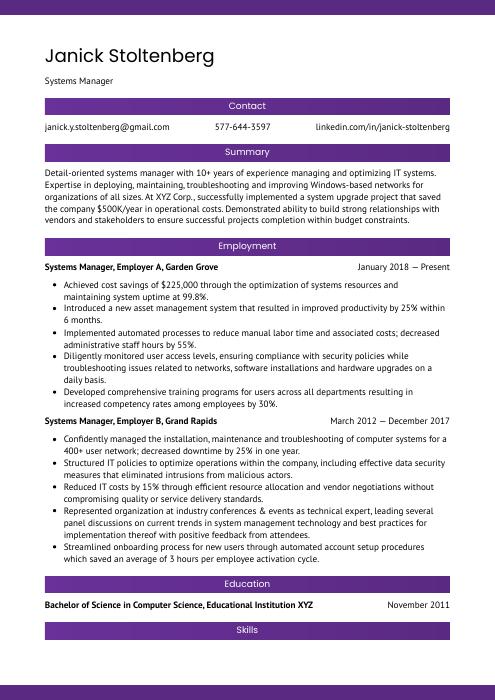 Jerboa
Jerboa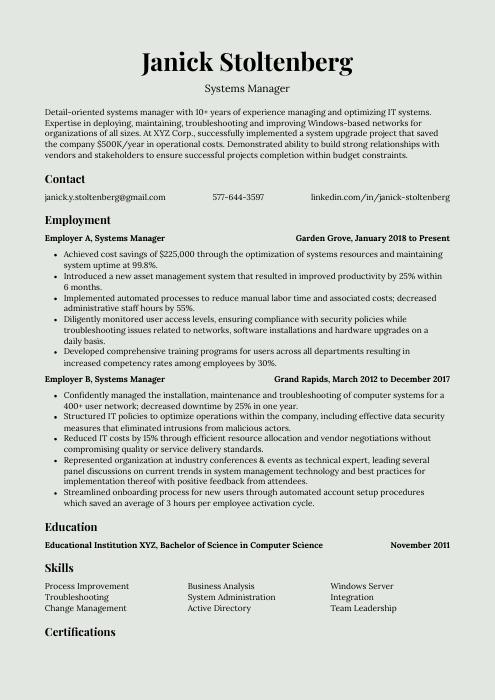 Saola
Saola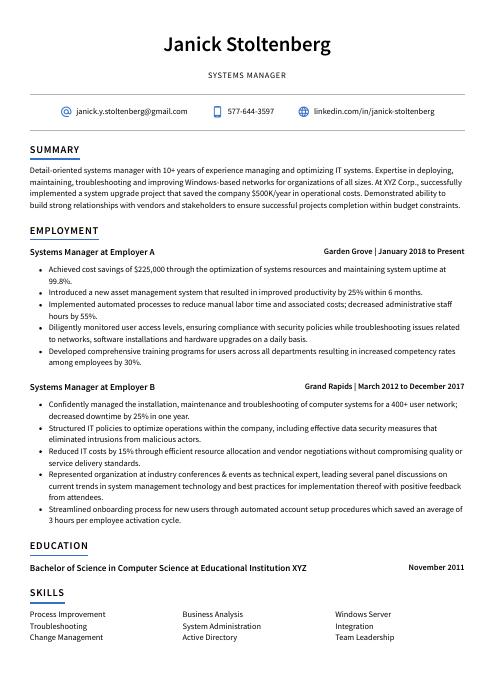 Axolotl
Axolotl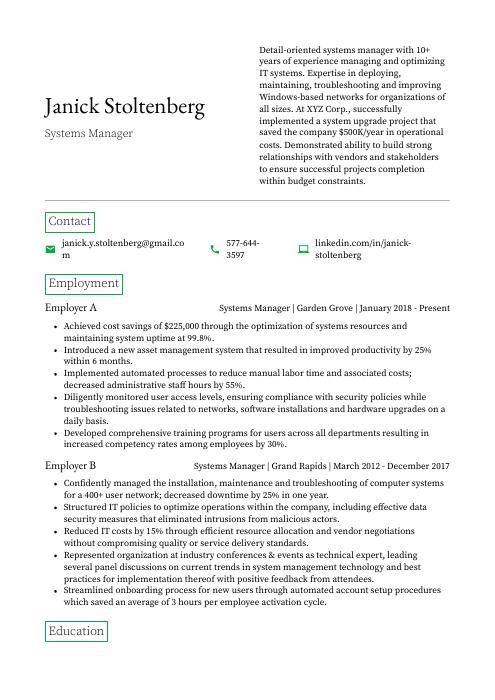 Quokka
Quokka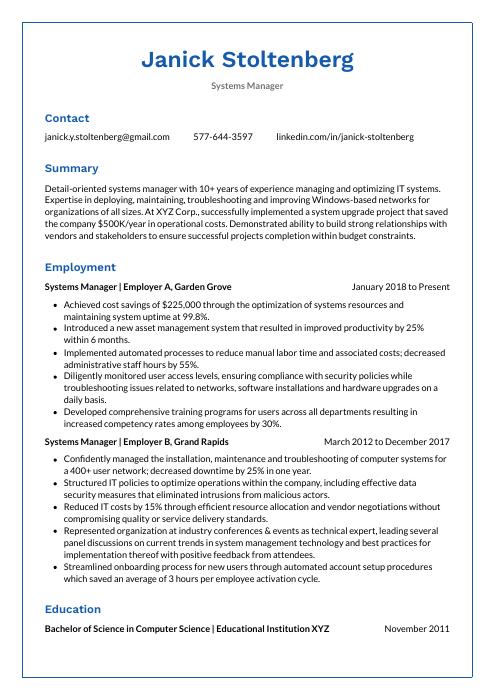 Markhor
Markhor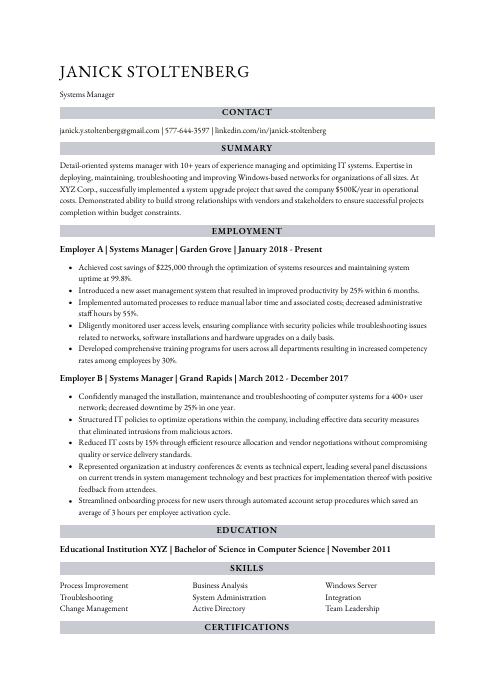 Numbat
Numbat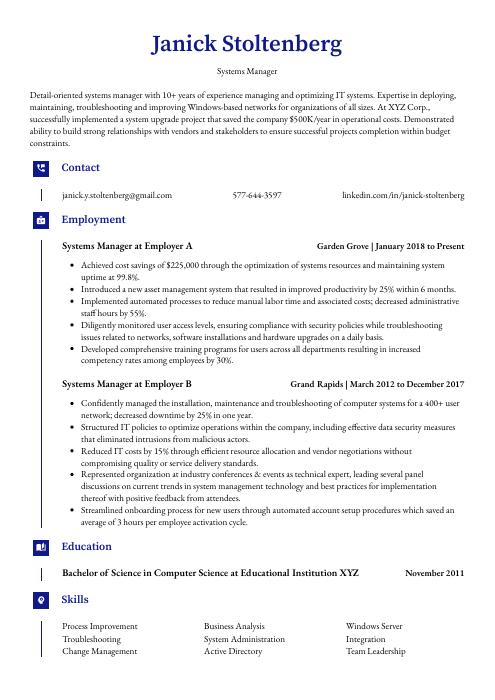 Gharial
Gharial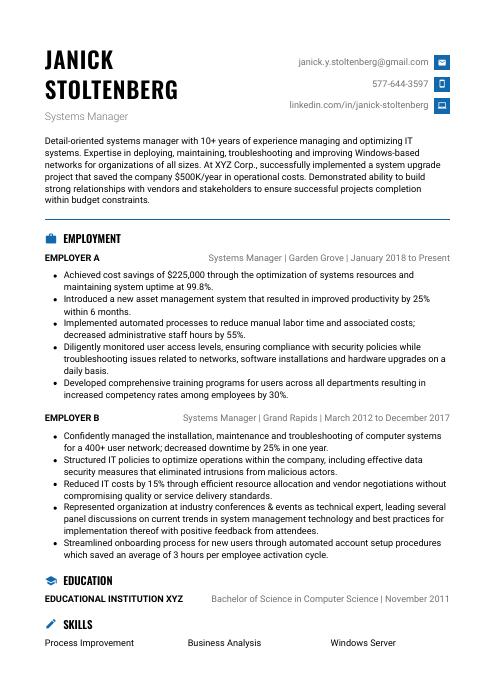 Echidna
Echidna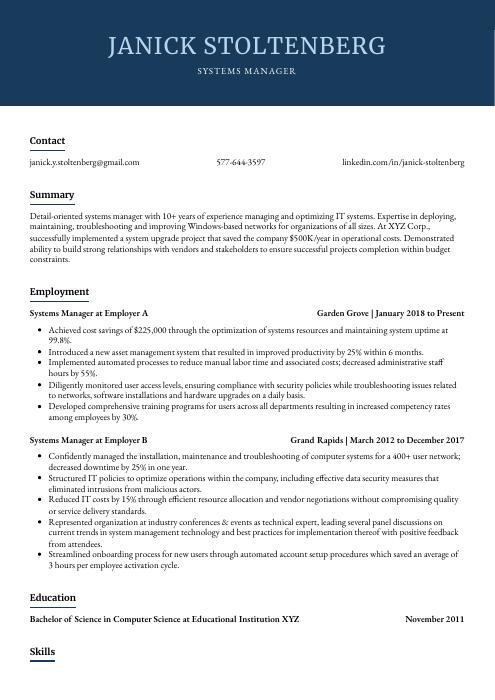 Bonobo
Bonobo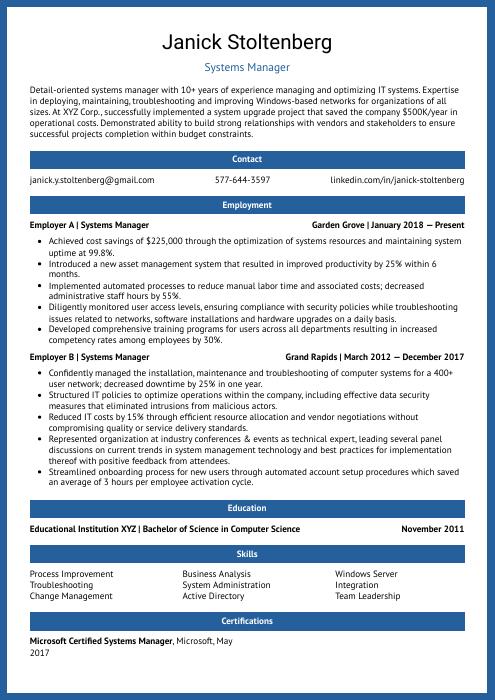 Ocelot
Ocelot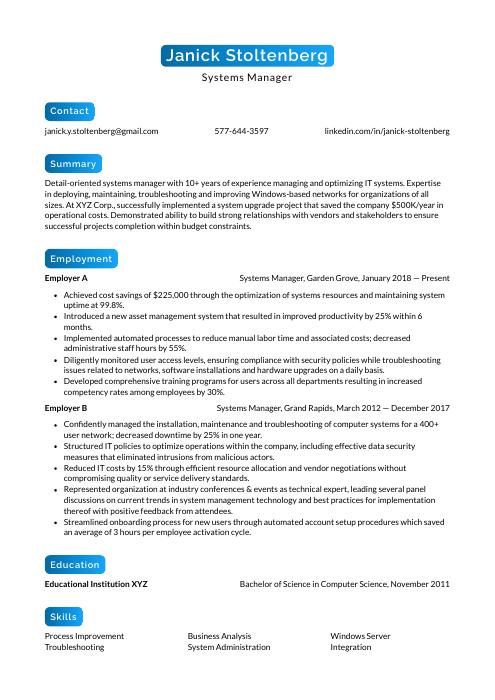 Kinkajou
Kinkajou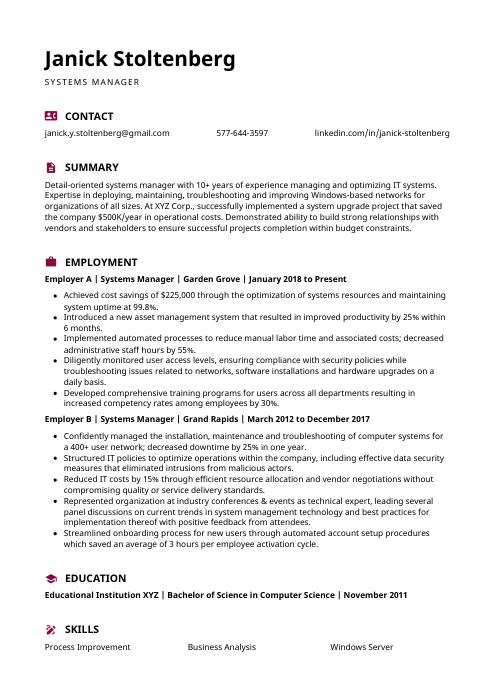 Hoopoe
Hoopoe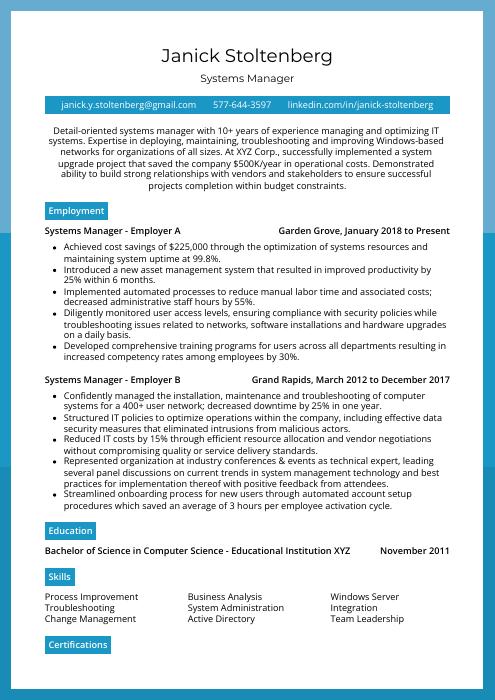 Rhea
Rhea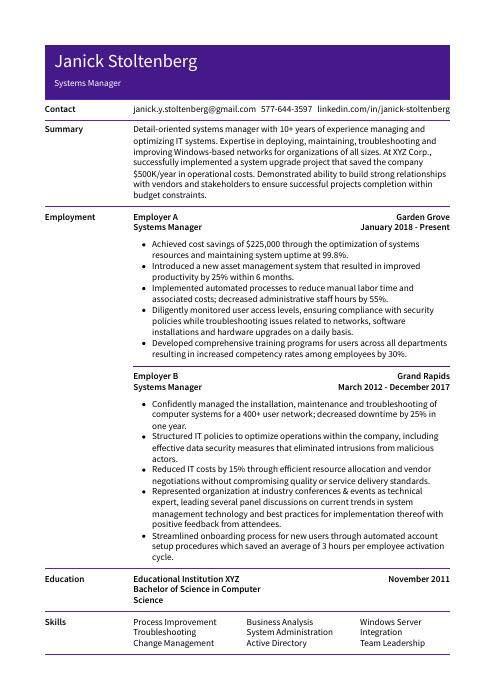 Pika
Pika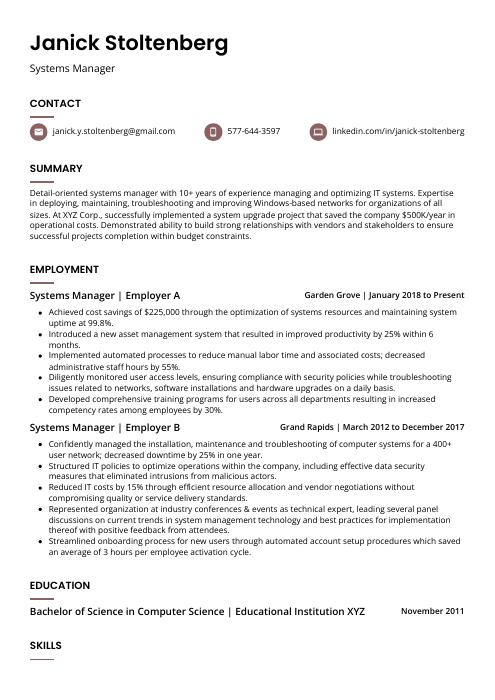 Fossa
Fossa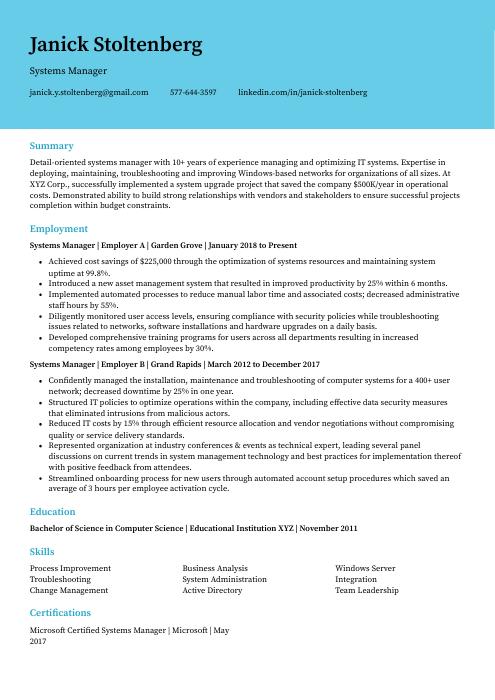 Dugong
Dugong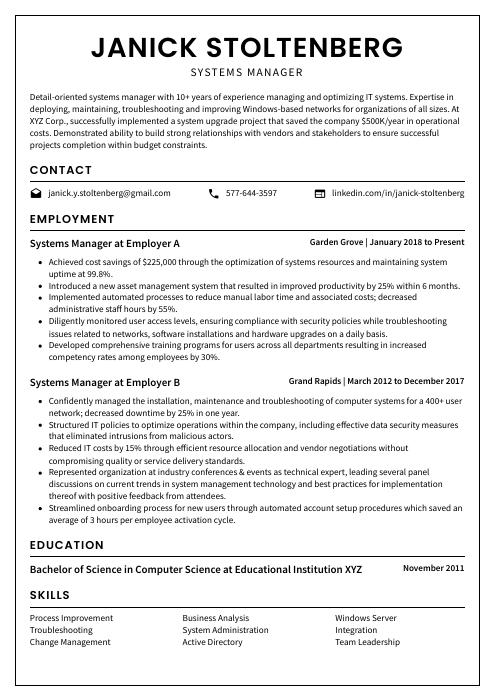 Cormorant
Cormorant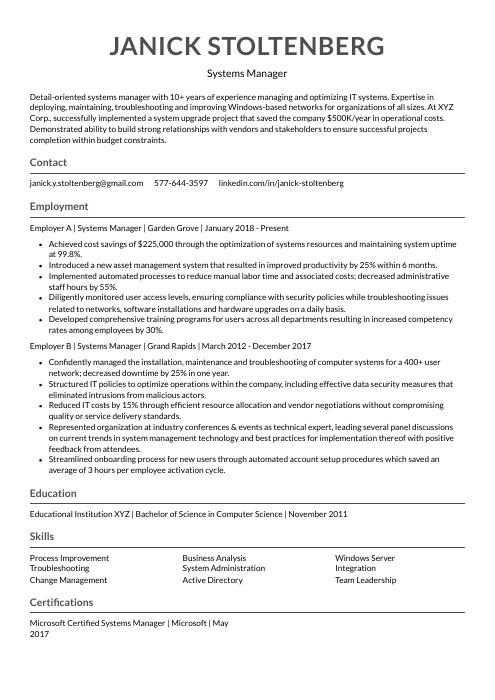 Indri
Indri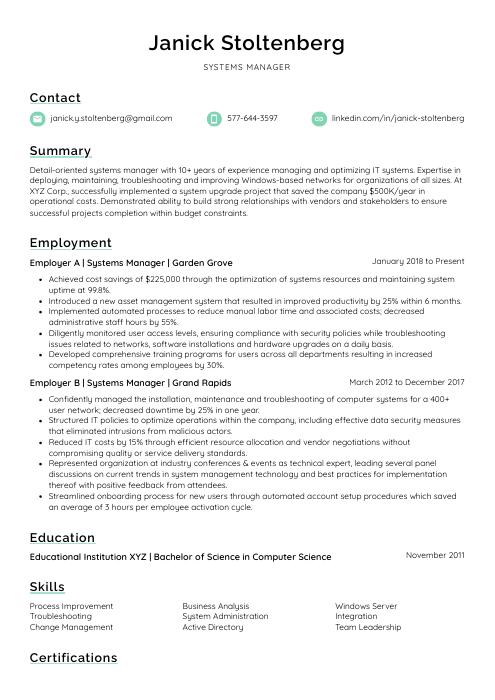 Lorikeet
Lorikeet Rezjumei
Rezjumei
